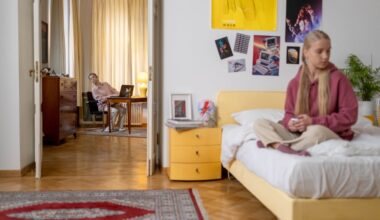Living alone has its perks, freedom, quiet, and full control over your space. But without structure, it can also feel isolating or unproductive. A solid daily routine helps you feel grounded, balanced, and mentally healthy. These twelve habits aren’t rigid rules, they’re small, intentional acts that give your solo life rhythm and meaning. Whether you’re new to independent living or just need a reset, these routines will help you stay sane, focused, and content with your own company.
1. Make your bed every morning

It’s simple, but making your bed first thing adds instant order and signals your brain that the day has begun. It creates a small win early in the morning and gives you control over your space. Even if nothing else goes as planned, coming home to a neat bed offers comfort. This small action builds discipline and brings calm to your daily routine, especially when you’re living alone and the little things matter more than ever.
2. Set a wake-up time and stick to it

When no one else is around, sleeping in feels easy, but a consistent wake-up time adds vital structure to your day. It improves your mood, sharpens focus, and helps regulate your body clock. You’ll feel more productive, energized, and less anxious when your mornings have a rhythm. Waking up at the same time daily, even on weekends, also makes evenings more restful. It’s a cornerstone habit that keeps you steady and intentional when living alone.
3. Start the day with sunlight

Natural light in the morning boosts alertness and helps set your internal clock. Open the curtains, drink coffee by the window, or step outside. Even five minutes can elevate your mood and reduce that foggy morning feeling. Sunlight increases serotonin, which helps you feel calm and focused. When you live alone, your environment has a powerful impact on mental health. This easy morning habit starts your day with clarity, warmth, and a lift in spirits.
4. Prep meals at home

Cooking for one doesn’t have to mean boring food or extra effort. Meal prep builds routine and reminds you to care for yourself. Choose simple recipes, batch cook, or prep ingredients in advance. It saves money, boosts nutrition, and gives you a break from screens. Even one homemade meal a day can become a grounding ritual. When you live alone, cooking creates rhythm and intention, and reminds you that you’re worth the effort every time.
5. Do a 10-minute tidy-up
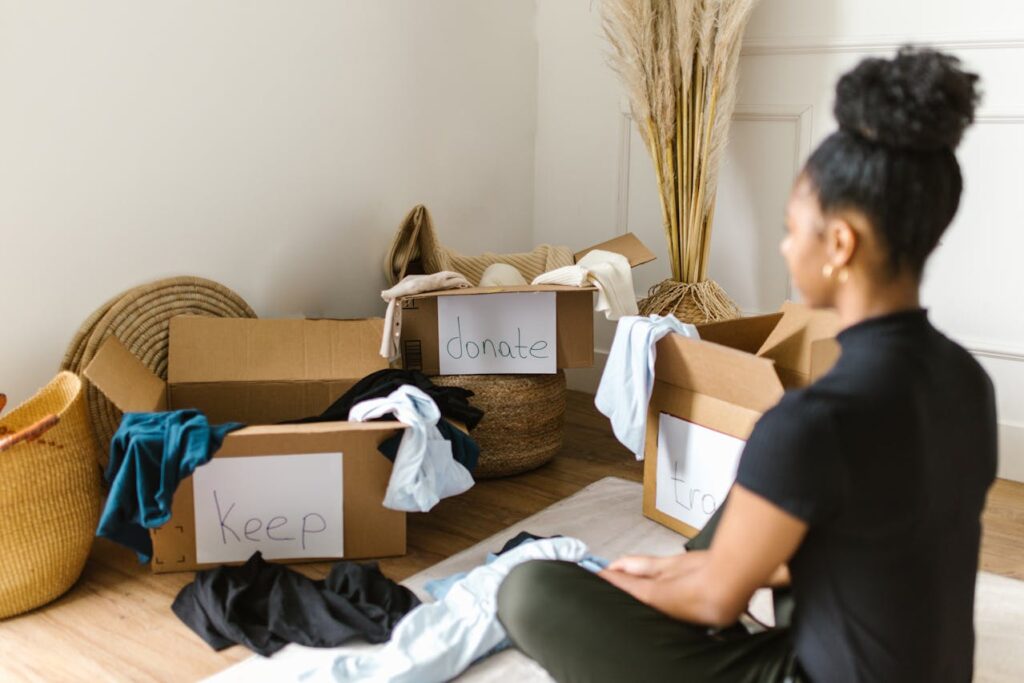
It’s easy to let clutter pile up when no one else is around, but mess can affect your mood and motivation. A short daily cleanup, making the bed, washing dishes, folding laundry, keeps your space peaceful and your mind clear. It prevents overwhelming weekend chores and builds pride in your environment. Living solo means no one tells you to clean, so a quick tidy ritual helps you stay organized and feel more in control every day.
6. Take a solo walk or stretch break
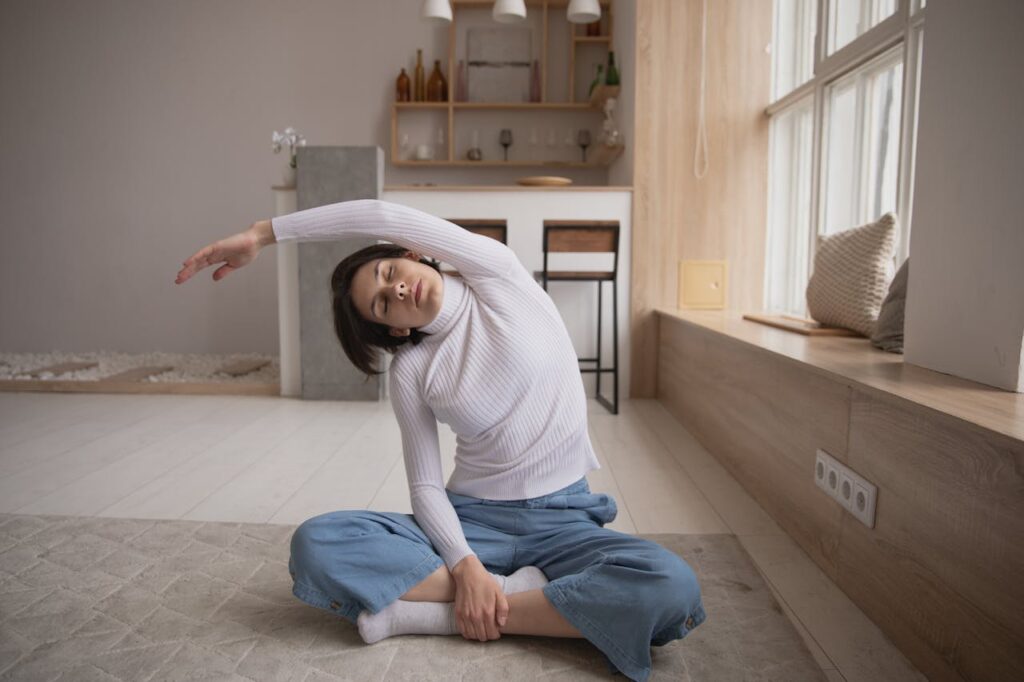
Movement is vital, especially if you work from home or spend a lot of time indoors. A daily walk clears your mind, boosts endorphins, and connects you to the outside world. Even if you just stretch for 10 minutes in your living room, it helps break up the day. Physical activity relieves stress and supports mental clarity. Living alone can feel sedentary without intention, so make movement part of your rhythm, it’s good for both body and mind.
7. Talk to someone daily, even briefly
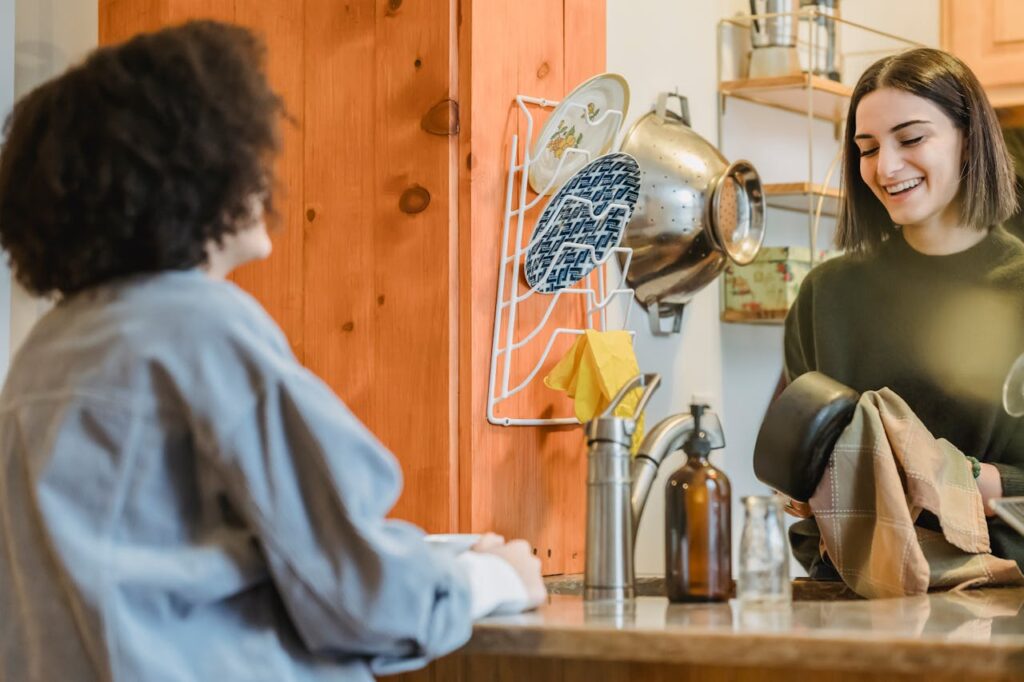
Living alone doesn’t mean you should isolate yourself. A quick call, message, or casual conversation can lift your mood and ease loneliness. You don’t need deep talks every day, a friendly check-in or short exchange helps you stay socially connected. Consider texting a friend, joining a group chat, or chatting with a barista. Even small interactions make a difference. Consistent human contact keeps you emotionally grounded and reminds you that you’re not really alone in the world.
8. Schedule downtime (yes, on purpose)

When you live alone, everything can feel like free time, but real rest is intentional. Block out time to unwind: watch a show, read a book, take a long bath. This prevents burnout and breaks the cycle of passive scrolling or overworking. Planned downtime gives you something to look forward to and restores energy. It’s not lazy, it’s smart self-care. Make relaxation a part of your routine to feel more present and emotionally balanced every day.
9. Journal one thing you noticed today

Journaling doesn’t have to be deep. Just write one thing: a smell, a thought, something that made you smile. This tiny reflection builds mindfulness and helps you stay connected to the present. It turns routine days into meaningful ones. Over time, you’ll notice patterns, small joys, or lessons. When you live alone, journaling becomes a quiet companion that supports your mental clarity and emotional health. It’s a five-minute habit with long-lasting mental rewards.
10. Have a “wind-down” ritual
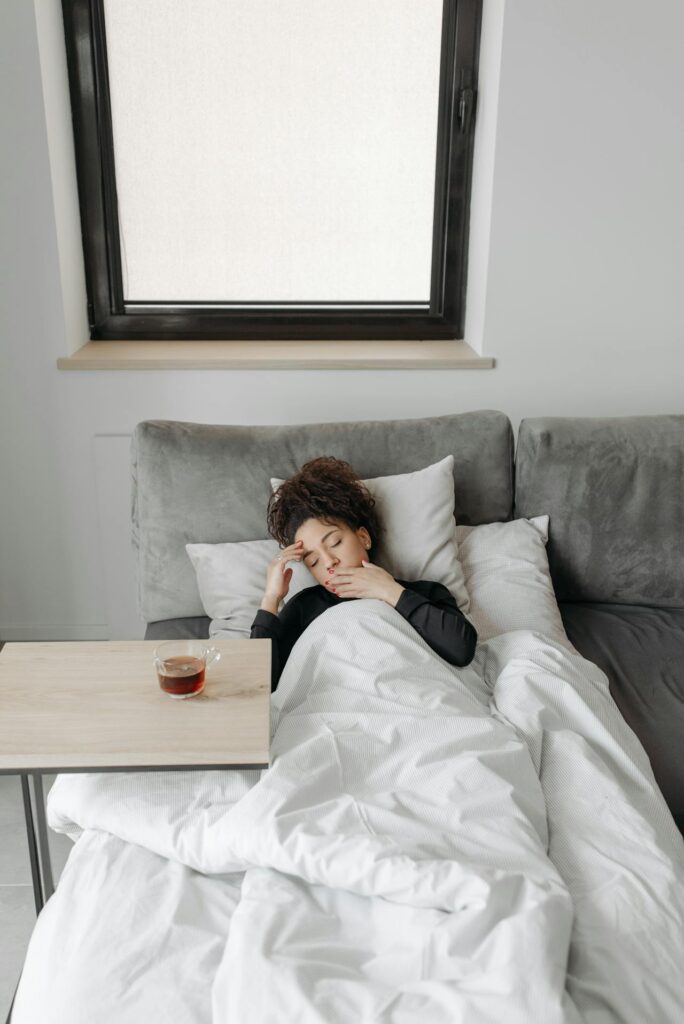
Don’t let screens or distractions push bedtime later and later. Create a calming evening ritual, dim lights, make tea, stretch, or read. This helps your body and brain transition into rest mode and improves sleep quality. You’ll feel more refreshed in the morning and less anxious at night. Living alone means you control your environment, so make it peaceful before bed. A soothing nightly rhythm signals safety and helps you recharge without relying on outside stimuli.
11. Limit passive screen time

Streaming and social media are easy companions, but too much can leave you feeling drained or disconnected. Be intentional, set limits or swap a show for a podcast or playlist. Try using screens as background for a task, not your whole activity. Mindful media use keeps your brain sharp and your mood stable. When you live alone, your habits shape your well-being, so choose content that inspires, educates, or genuinely relaxes, rather than numbing your thoughts.
12. Set goals for tomorrow before bed

End your day with a quick list, just 1 to 3 simple goals for the next day. It adds structure, keeps you motivated, and reduces decision stress in the morning. Your goals don’t have to be ambitious, try “water the plant” or “call Grandma.” Small achievements build momentum. When you live alone, this gentle habit gives purpose to your days and turns your space into one of progress and possibility. It’s your life, design it on purpose.


